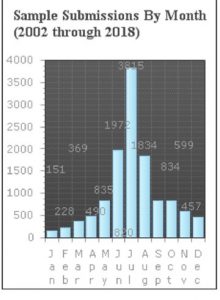June was a very busy month for the UD Plant Diagnostic Clinic, with 160 plant and arthropod samples logged into the data system. Of those samples, 133 or 86% were from Delaware, but 22 were from MD with 5 from VA. Most (87%) were for disease diagnosis, but there were some arthropod ID's, and some plant/weed ID's. Commercial samples through  Cooperative Extension accounted for 56% of samples. Ornamental plants made up 37% of samples, with environmental stress playing a role, and Botrytis and bacterial blight showing up. Vegetable samples made up 40% of the total, and Field Crops 12%. Take all of wheat was diagnosed for the first time in a few years, and anthracnose and gray leaf spot have been seen on corn. Potato and tomato were diagnosed with early blight caused by Alternaria.
Cooperative Extension accounted for 56% of samples. Ornamental plants made up 37% of samples, with environmental stress playing a role, and Botrytis and bacterial blight showing up. Vegetable samples made up 40% of the total, and Field Crops 12%. Take all of wheat was diagnosed for the first time in a few years, and anthracnose and gray leaf spot have been seen on corn. Potato and tomato were diagnosed with early blight caused by Alternaria.
Tag: UD Plant Diagnostic Clinic
UD Plant Diagnostic Clinic Final Report 2016
During 2016, the Plant Diagnostic Clinic processed approximately 656 non-survey routine clinic samples. Nursery surveys for Delaware Department of Agriculture resulted in a few samples of boxwood and gardenia. Other samples were diagnosed in field situations, and not brought in for analysis. Phone inquiries and e-mail requests for information were replied to in addition to physical specimens submitted to the lab. Most samples were from Delaware. Crop sources for those were, in order of predominance: Ornamentals (55 %), Vegetables (22%), Field Crops (10%), Fruit, Turf, Insect ID, Fungal ID, and Christmas trees.
Take a look at the full report: Delaware Plant Diagnostic Clinic Report 2016 Final Feb 2017
NFG 2/1/2017
UD Plant Diagnostic Clinic Report for 2015
The final report for the UD Plant Diagnostic Clinic for 2015 has been posted and can be viewed at the following link:
Final Delaware Plant Diagnostic Clinic Report 2015 2_10_2016
The Plant Diagnostic Clinic at the University of Delaware is housed in the Department of Plant and Soil Sciences, and is located in Townsend Hall, Room 151. The clinic serves the public through Delaware Cooperative Extension, directly serving commercial growers, crop consultants, nurserymen, landscapers, public gardens, and private homeowners. Samples are also received through county offices, from Extension specialists, and the Master Gardener Program. The clinic is the National Plant Diagnostic Network (NPDN) laboratory for Delaware, and the survey laboratory for Delaware Department of Agriculture and USDA/APHIS CAPS for Delaware. The clinic operates with one full-time staff, the Plant Diagnostician, cooperating with the Extension Plant Pathologist and the Ornamentals IPM Specialist in Entomology, and numerous Extension personnel.
During 2015, the Plant Diagnostic Clinic processed approximately 630 non-survey routine clinic samples. A National USDA/APHIS PPQ CAPS karnal bunt survey in cooperation with Delaware Department of Agriculture for wheat seed samples from all grain elevator processing stations in Delaware included five composite aliquot samples. All samples examined for the presence of karnal bunt were negative, ensuring the safety of the Delaware wheat crop for trade and export. Nursery surveys for Delaware Department of Agriculture resulted in a few samples of boxwood and chrysanthemum. Other samples were diagnosed in field situations, and not brought in for analysis. Phone inquiries and e-mail requests for information accounted for undocumented samples in addition to physical specimens submitted to the lab. The Ask an Expert service through eXtension.org included 69 questions answered by the Diagnostician in 2015. Over 50 % of the total questions answered via Ask an Expert for Delaware involved trouble-shooting of possible disease issues. Some trouble-shooting samples for possible nematode infections were processed in the lab, but are not included in this report.... see link for full report and data.
NFG 2/11/16
